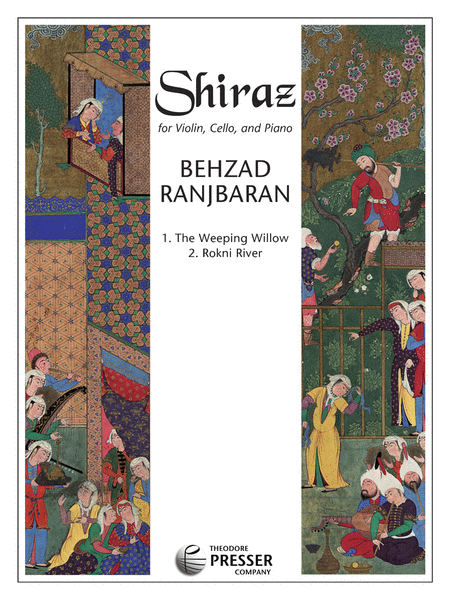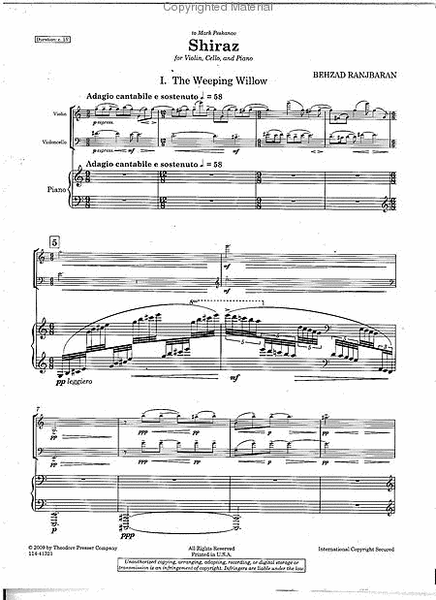Shiraz
For violin, Cello and Piano
-
Ships in 1 to 2 weeks
Details
Description
SKU: PR.114413210
For violin, Cello and Piano. Composed by Behzad Ranjbaran. Saddle. Set of Score and Parts. With Standard notation. 36+12+12 pages. Duration 15 minutes. Theodore Presser Company #114-41321. Published by Theodore Presser Company (PR.114413210).ISBN 9781598062052. UPC: 680160575091. 9 x 12 inches.
An ode to the city of Shiraz in southern Iran, many of Behzad Ranjbaran's melodic, rhythmic, and musical characters are inspired by Persian culture and its vocal and instrumental music. Movement one, "The Weeping Willow", was influenced by the composer's vision of three poets in a gentle but heated poetic discourse, with a musical phrase beginning with one instrument and then circulated and repeated in a refined exchange. The second movement refers to a river in Shiraz often cited in Iranian poetry. The composer elaborates: "As the opening [of the second movement] descends into the whispering murmur of water waves, it soon builds to climactic crashing chords, all pointing to the vitality of life represented by the river. There is also allusion to the playful character of folk music with irregular rhythmic patterns, repeated short melodies, and jesting pizzicato sections..propelling the piece to an energetic conclusion."_________________________________________BEHZAD RANJBARANBorn in Tehran, Iran, Behzad Ranjbaran frequently draws inspiration from his Persian heritage. Shiraz is one of several works in his catalogue that draw directly on this background, inspired by place, literature, art, or the sounds of traditional instruments. Among the Persian-influenced chamber works are Isfahan (clarinet, harp, and string quintet), Fountains of Fin (flute, violin, cello), and Piano Quintet which evokes a Persian wedding in the final movement. Hisorchestral works include the so-called “Persian Trilogy” (Seven Passages, Seemorgh, and The Blood of Seyavash), based on legends from the ancient epic poem, “Shahnameh” (Book of Kings). The Trilogy was recorded for Delos by the London Symphony Orchestra, conducted by JoAnn Falletta; it received its first complete live performance in 2008 by the Toronto Symphony under Ms. Falletta, in a multimedia concert celebrating the millennium of “Shahnameh.”Mr. Ranjbaran has written works for Renée Fleming, Joshua Bell, and Jean-Yves Thibaudet, among others, and has had residencies with the Philadelphia Orchestra at the Saratoga Music Festival, and the Fort Worth Symphony Orchestra. Jean-Yves Thibaudet premiered his piano concerto, commissioned by the Atlanta Symphony and conducted by Robert Spano. Songs of Eternity on the Ruba’iyat of Omar Khayyam, written for soprano Renée Fleming, was premiered with the Seattle Symphony under the direction of Gerard Schwarz. Joshua Bell was the soloist in the premiere performances of the Violin Concerto with the Royal Liverpool Philharmonic Orchestra, also conducted by Schwarz. Mr. Bell went on to give the work’s North American premiere with the Indianapolis Symphony, conducted by Mario Venzago, and subsequent performances with Peter Oundjian and the Toronto Symphony. In addition, Chantal Juillet was the soloist in a performance of the Violin Concerto with Charles Dutoit and the Philadelphia Orchestra.Named a “Distinguished Artist” by the New Jersey Council on the Arts, Ranjbaran’s honors also include grants from National Endowment for the Arts and Meet the Composer, and a Charles Ives Scholarship from the American Academy of Arts and Letters; his Violin Concerto was awarded the Rudolf Nissim from ASCAP.Ranjbaran’s musical education started early when he entered the Tehran Music Conservatory at the age of nine. After arriving in United States in 1974, he attended Indiana University and received hisdoctorate in composition from The Juilliard School, where he currently serves on the faculty. For further information, please visit www.behzadranjbaran.com.
Shiraz is a southern Iranian city situated near the ruins of Persepolis, the 500 B.C. capital of Persia. In writing SHIRAZ (for violin, cello and piano), I aimed to reflect on some of the elements that have made this city famous: its poets, historic gardens, nightingales, and wine.My first trip to Shiraz at age 14 became an enduring influence on my life, and my affection for the city only grew in subsequent visits. In Persian culture, Shiraz is tantamount to life’s beauty, artistry and peace. The concept of Persian gardens, as a reflection of paradise on earth, was by and large developed in this region over several thousands years.Many of the melodic, rhythmic, and musical characters in SHIRAZ are inspired by elements of Persian culture and its vocal and instrumental music. In the first movement, “The Weeping Willow,” I was influenced by the notion of three poets under a weeping willow tree engaged in a gentle, but at times heated, poetic discourse, revealing some of their most tender and profound thoughts and feelings. At times, a musical phrase will begin with one instrument and is then passed around repeatedly in a refined dialogue and exchange. This follows a highly cultivated tradition of Mosha’ereh (poetic discourse) in Iran when literary individuals speak only in verse on varied subjects of human characters and emotions, thus establishing a spiritual bond among the participants. Often, one expresses his affection and mastery of the craft by completing a verse that was begun by another.The second movement, “The Rokni River,” refers to a river in Shiraz where poets, particularly hafiz, revered in their verses. The thematic material is closely related to the first movement, thus creating an organic relationship between both movements. as the opening descends into the whispering murmur of water waves, it soon builds to climactic crashing chords, all pointing to the vitality of life represented by the river. There is also allusion to the playful character of folk music with irregular rhythmic patterns, repeated short melodies, and jesting pizzicato sections. The finale begins with a whispering murmur that quickly turns into a cascading rush of fast notes that propels the piece to an energetic conclusion.SHIRAZ was commissioned and premiered by Barge Music in Brooklyn, New York, on August 31, 2006.— Behzad Ranjbaran.


 Share
Share